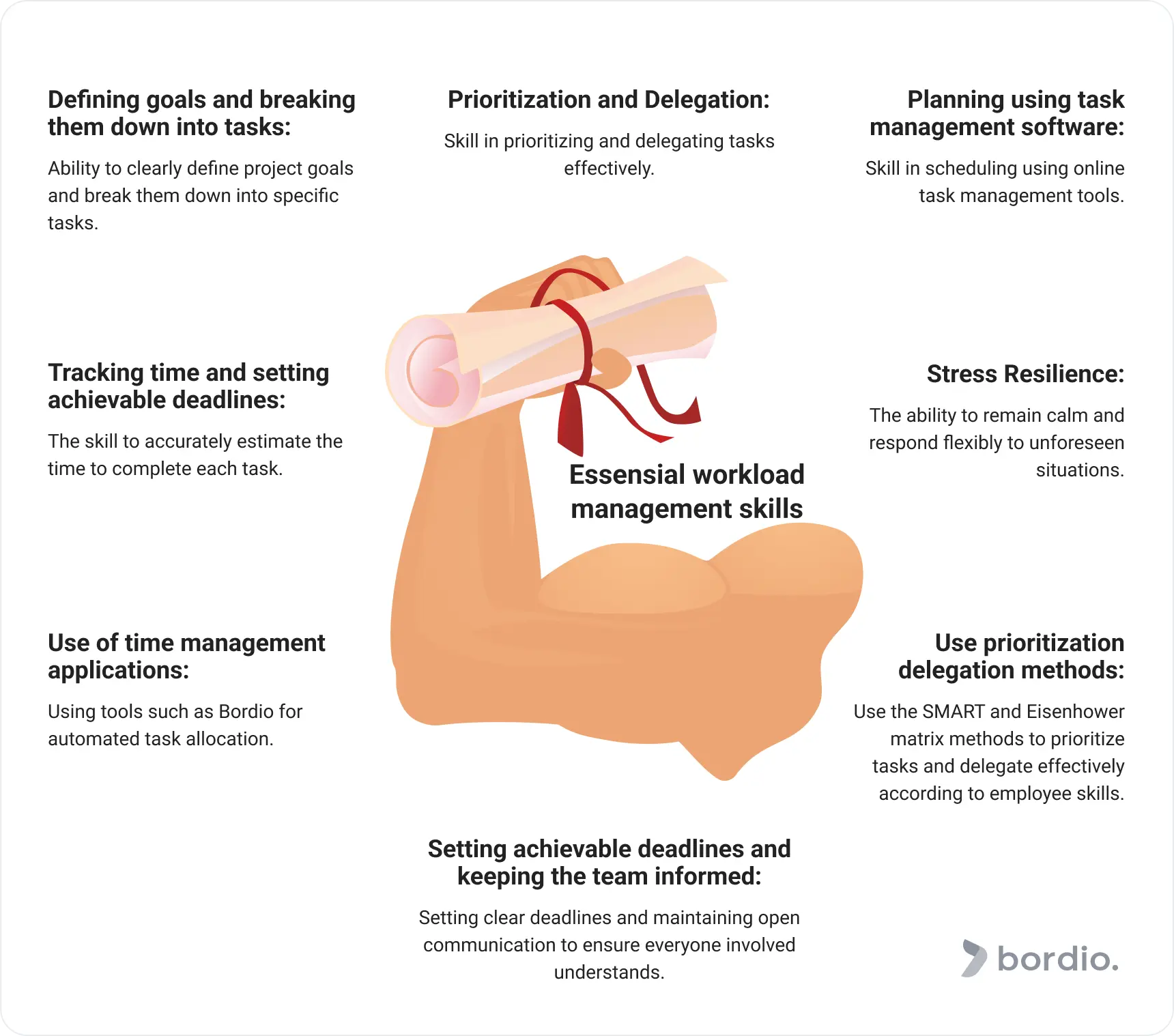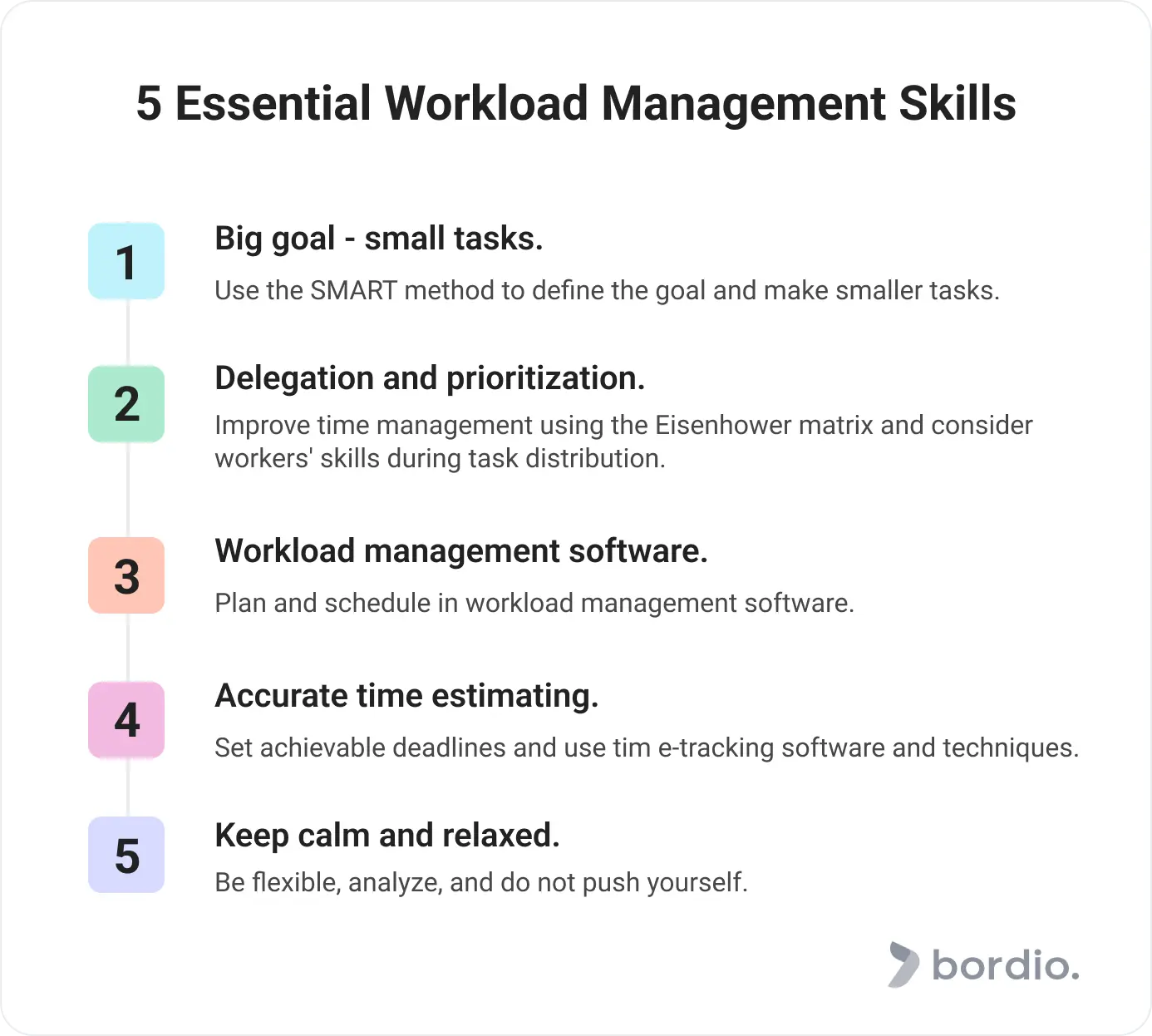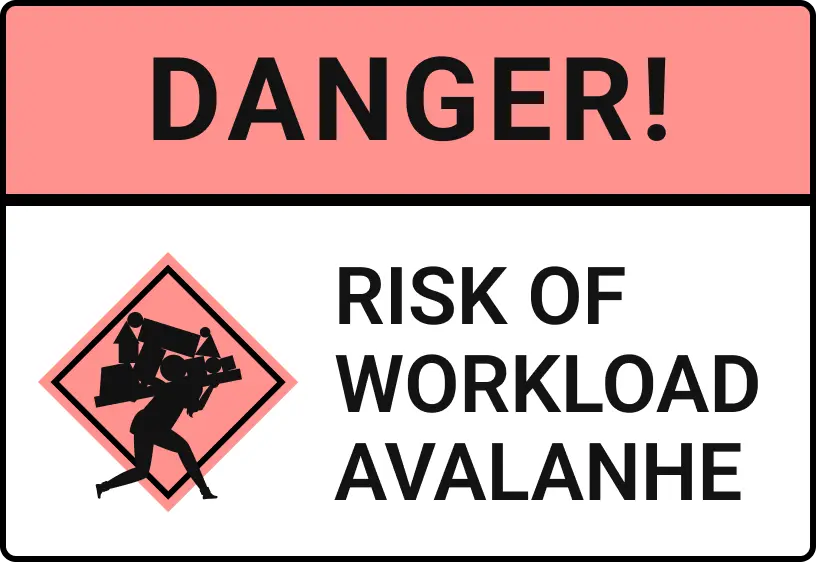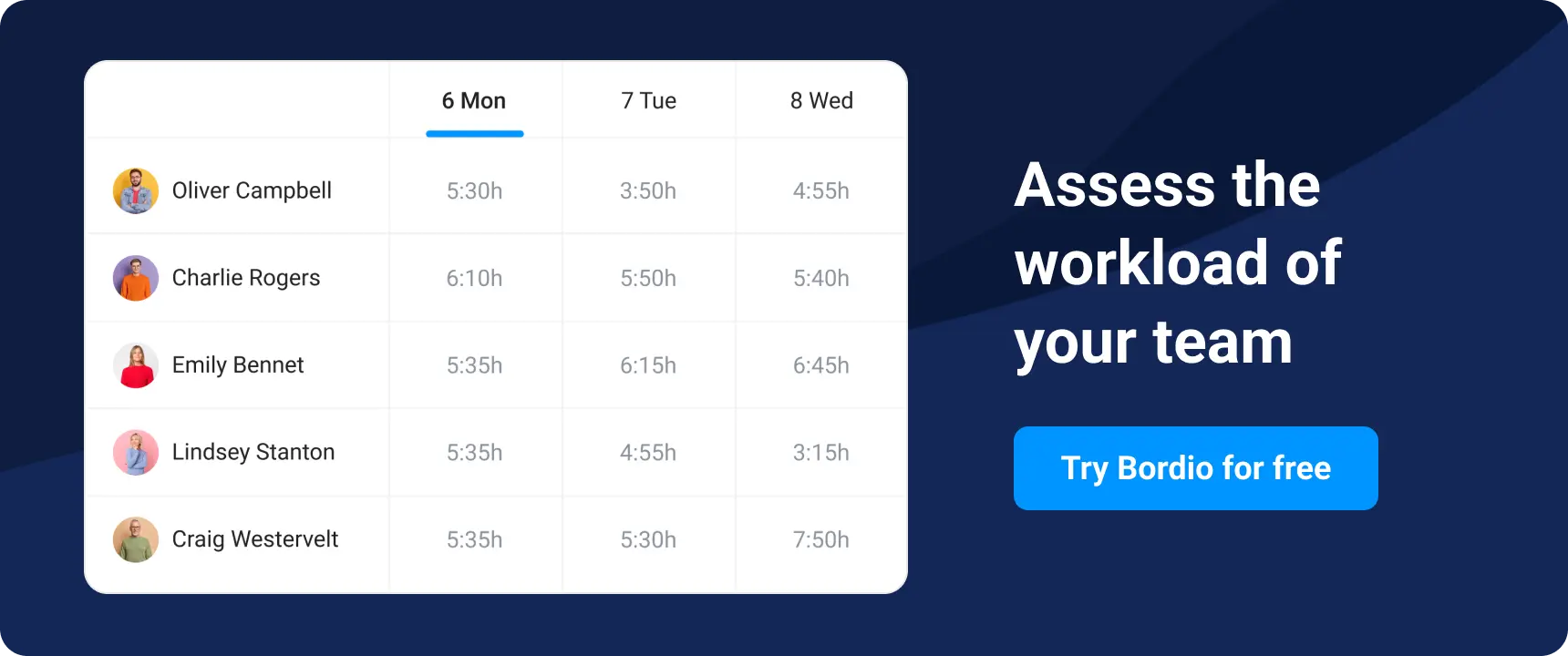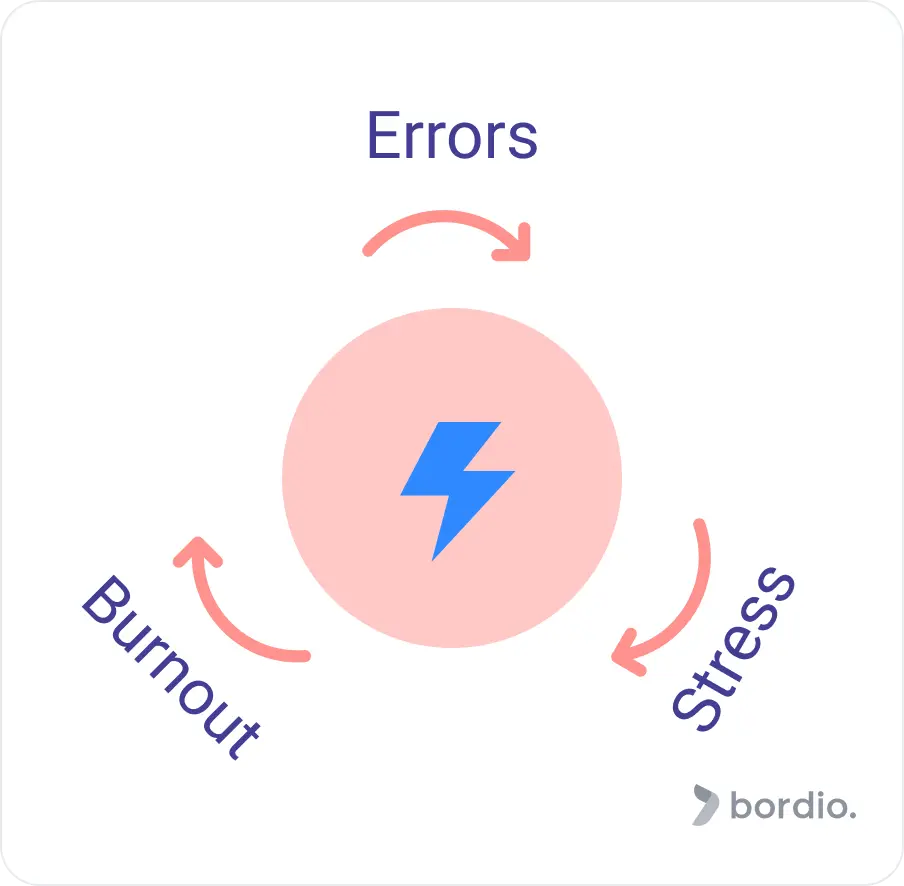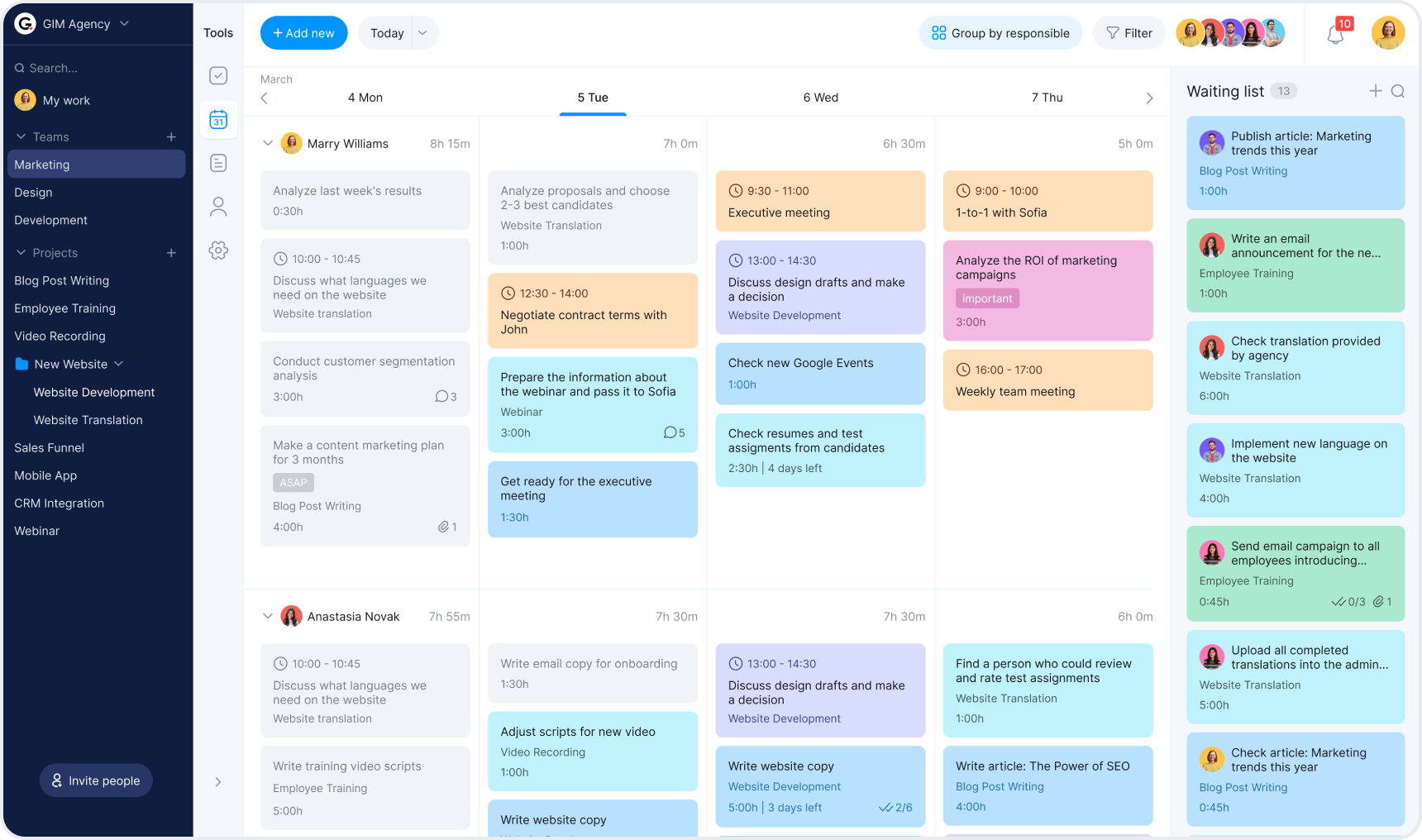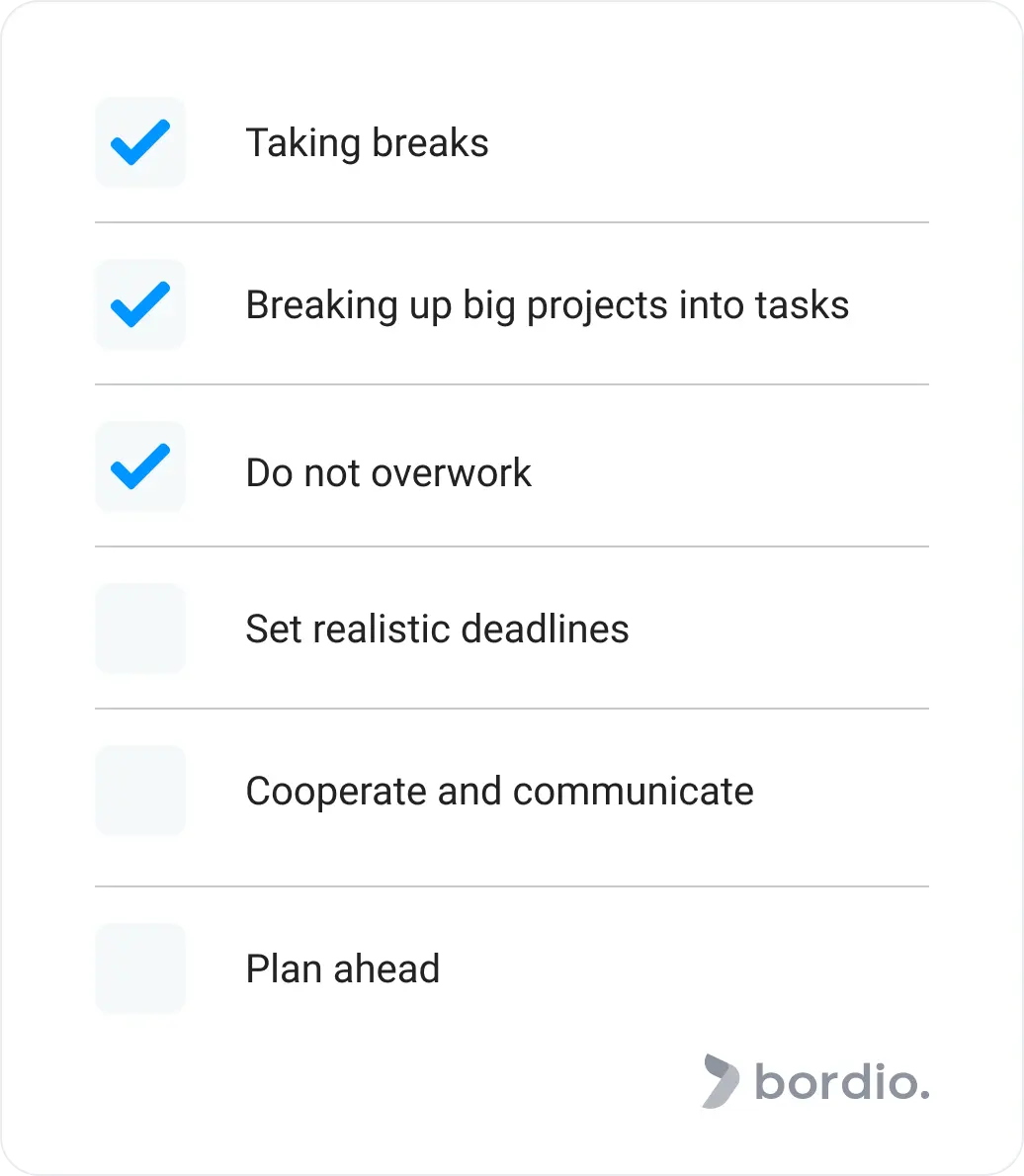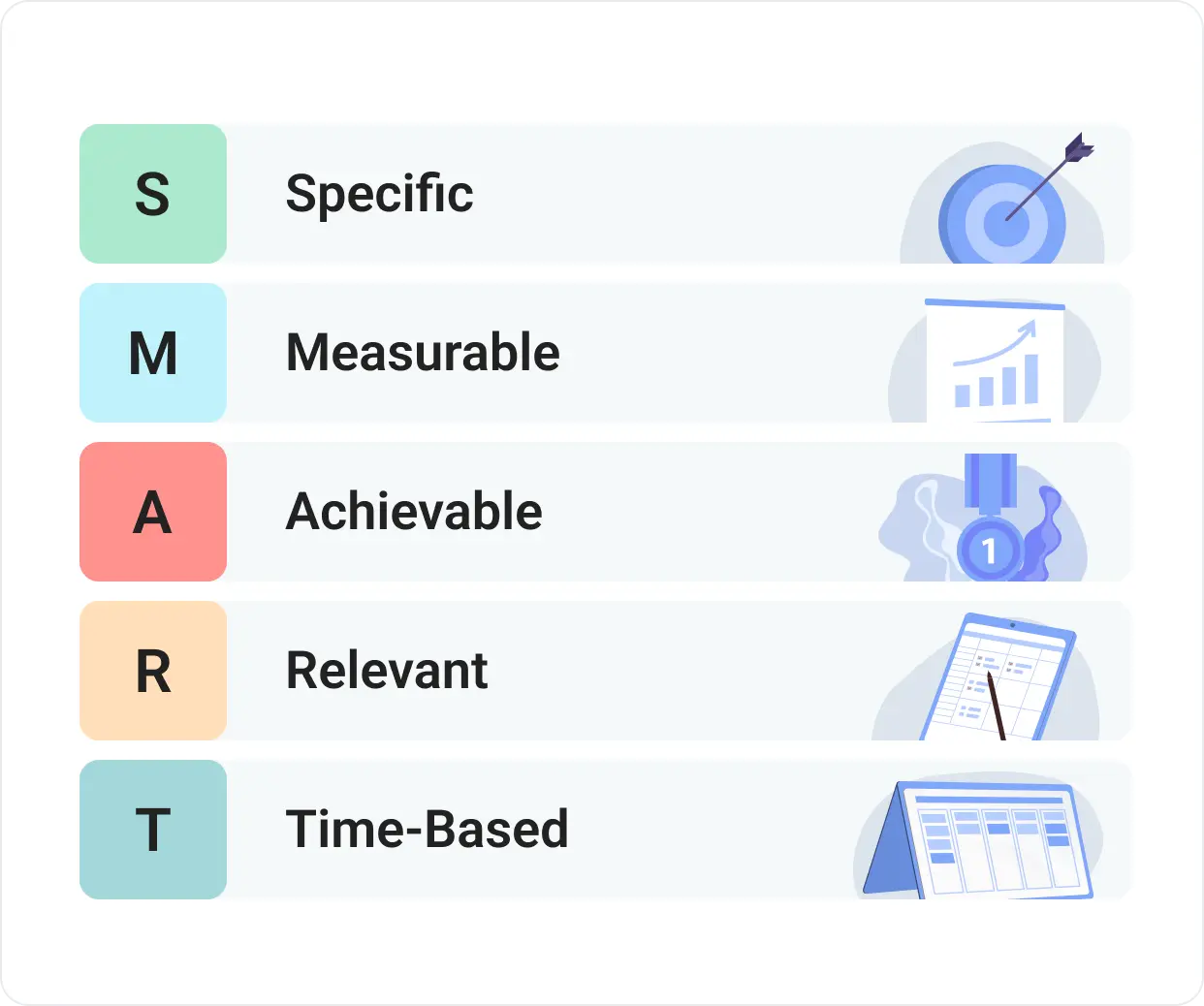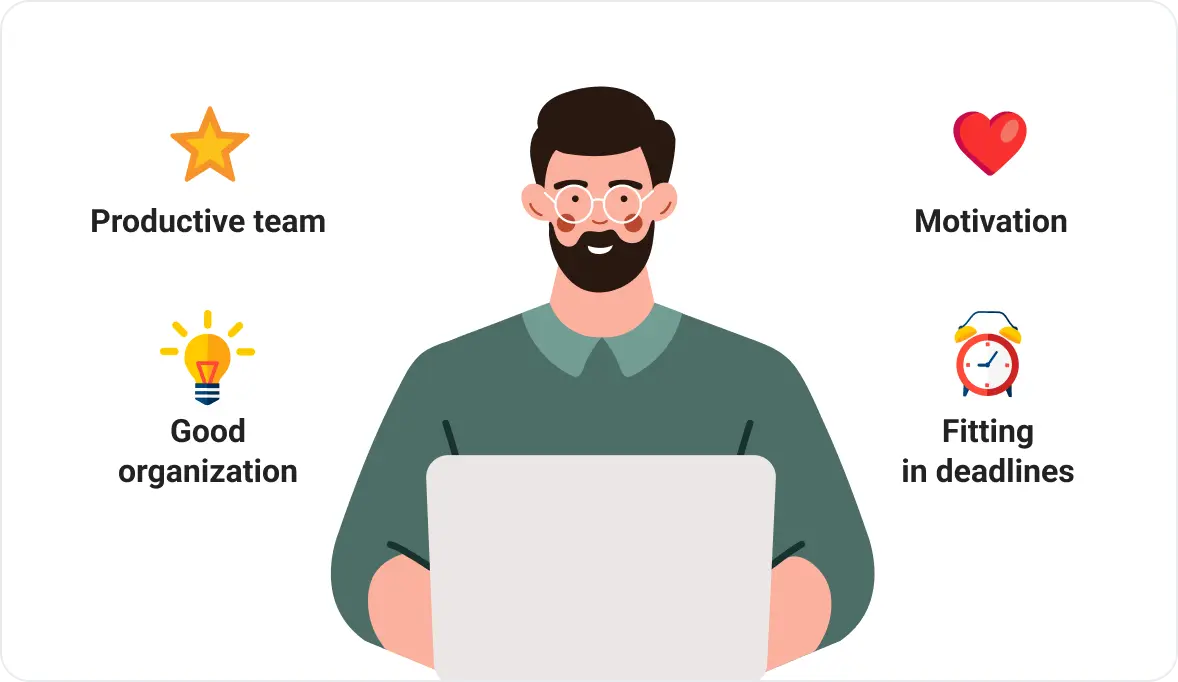Indeed, every manager or boss has faced the fact that his team has become less productive and does not cope with deadlines. They have also probably faced the problem of employee loss due to burnout and stress in the workplace. What could be the reason for this phenomenon? We will help you understand this, introduce you to the concept of workload management, and teach you how to apply the very workload management skills.
What are workload management skills?
So, let’s take a closer look at the concept of workload management skills. Proper team workload management is an environment where tasks are evenly distributed according to team members’ skills. Team workload management is reasonableness in distributing duties and tasks, good time management, and proper delegation of responsibility. Successful workload management is necessary to increase team productivity, creating an environment where team members are given tasks that match their capabilities. Workload balancing is essential to ensure employees don’t burn out and have the right work-life balance. So, what are the critical workload management skills you need to learn?
1. Defining goals and breaking them into tasks
The first skill constitutes establishing clear goals while planning the project and, to understand better how to accomplish the goals, break each down into more focused tasks. We recommend using the SMART criteria method (specific, measurable, attainable, relevant, and time-bound) and implementing task-tracking tools into the planning stages.
2. Use prioritization and delegation mechanics
Second is the skill of setting priorities and delegating tasks to them. To improve time management, you can use an Eisenhower matrix method to divide tasks into quadrants according to significance and urgency. Also, of course, it is necessary to consider the skills and abilities of workers during distribution and not just distribute tasks to those who are free now.
3. Scheduling with workload management software
The next stage is scheduling; plan for the upcoming day, week, or month while considering the importance of each work and its due date. An essential skill for someone who does planning – is to plan and schedule using online task-planning tools. The world is evolving rapidly, and you need to keep up with the times and be able to use not only artificial intelligence everyone is talking about but also online planning tools. This is much more convenient than the usual paper planners, especially when working in a team – as it will be easier for you to distribute tasks in online team software, and all team members can immediately check it on their devices.
4. Time tracking and making achievable deadlines
To prevent overload and boost productivity, it’s crucial to have the skill of accurately estimating the amount of time required to do each work and when completing it. Project management tools like Bordio help to manage work and deadlines better. Plans might alter due to unforeseen situations. Therefore, online planners are adaptable and prepared to make changes if needed.
5. Stress tolerance
Unforeseen situations happen to everyone, and the ability to keep calm and relaxed to solve problems and change plans flexibly is the final skill project managers will need. In addition, it is also crucial if you want to maintain a pleasant working environment and resolve conflicts as a pro. It is essential to analyze situations, understand why certain plan lapses happen, and figure out how to let them happen less often. Once you have mastered these skills, you can confidently call yourself someone who can cope with the adjustment of the workload.
Why workload management skills are essential?
Having these skills of workload management is important for your and your team’s overall job satisfaction. Assigning responsibilities to team members properly will make the team productive but not overloaded, maximizing their potential for maximum output. Employees will not feel overwhelmed and insignificant if they have less work than others. By managing the team’s workload, this favorable atmosphere will improve every team member’s productivity, increase their level of happiness, and reduce employee turnover.
You can develop reasonable and achievable work plans as you improve your workload management skills. Also, you will be able to set the right work expectations and deadlines, which will be beneficial to your business. Moreover, it will reduce the likelihood of you over- and under-delivering on your customer commitments. Thus, the quality of your products and services will increase, and your trustworthiness will also increase.
Apart from the fact that your plans are more likely to be completed on time and within budget with good team workload management, there will also be fewer delays and interruptions in your project. This is all connected with the state of your employees, and because you are correctly assigning responsibilities and paying attention to the work environment – this will help employees feel better. The aftermath will positively affect – improving your brand reputation.
Potential problems of lack of workload management skills
So, if you think there can be no extraordinary consequences for not monitoring the workload and not being able to handle it for your team, then let’s also look at the points of problems that can be created due to these circumstances.
Increase in the amount of errors.
First and foremost is an increase in the number of errors at work. If a team member has a lot of work tasks and some of them are beyond his ability, and they were assigned to him simply because it seemed to the supervisor at the time that he had the least to do, then it is not surprising that he will fail at the tasks and make a lot of mistakes. In addition, a tired team member can also cause irreparable damage to the workflow and fail to meet deadlines. Thus, you will not only undermine the confidence of your superiors, but you may also undermine the confidence of sponsors or customers and lose resources.
High levels of stress and burnout at work
More work besides mistakes will also lead to stress, burnout, and other psychological troubles. Employees will start to get sick and quit, thus harming the work process and stopping it. Employees who receive a lot of tasks will feel overloaded, and those who receive fewer tasks will feel insignificant. Therefore, it is essential to consider the workload balance if you care about the well-being of your employees and the project.
Imbalance between personal and professional life
A large amount of work will not only lead to the usual stress but also erase the boundaries between work and the worker’s own life. Employees will have to stay extra hours in the office, and it will be hard for them to get rid of thoughts of work in their free time. As we have often mentioned, this leads to employee dissatisfaction and burnout.
Using Bordio to master workload management skills
And so the era when you often need to gather people for meetings and give them assignments in person, as well as using paper planners, is coming to an end, and now let’s find out how Bordio can help us develop abilities to manage the workload.
Bordio is an online work management software that will assist you with the help of an automated workload calculation. You may assign tasks in Bordio for the team members and track their progress toward completion. Keeping track of your team’s responsibilities and overseeing assignments as a project manager will be simple. Tasks and events will be in the calendar, and you can easily see the employee’s workload level as the program calculates it. With easy-to-use tools like Bordio, you can learn all the skills you need to manage your workload.
Bordio has a straightforward interface and features such as time blocking and a waiting list that can be used as a backlog for tasks and will help you manage a heavy workload. Additionally, Bordio has all the features you need for calendar tracking, so there is no need for any other apps. This time management software will be easy for your team to use and understand.
Workload management strategy in 3 crucial points
1. Utilize time-management applications to organize
Using time management applications to organize the disarray of duties and activities is the first pillar of a successful workload management plan. These applications, like Bordio, simplify task management and workload organization, including progress monitoring, synchronizing Google Calendars, and reminders. By implementing these technologies, individuals and teams may boost productivity, guarantee timely completion of assignments, and uphold an organized work style.
2. Prioritize and delegate – delegate and prioritize
The second crucial workload management competency is prioritizing tasks and delegating them effectively. Setting priorities is arranging tasks based on their urgency and significance. This helps to streamline productivity by guaranteeing that high-priority jobs receive rapid attention. Simultaneously, the ability to delegate or assign duties to team members based on their qualifications is refined. This increases productivity overall and cultivates a supportive and cooperative environment.
3. Set achievable deadlines and keep your staff informed
The third element of efficient job management is the establishment of clear deadlines and open channels of communication. Creating a structure for finishing activities involves defining precise and attainable deadlines. This entails limiting overload and distributing the burden by accurately predicting the time required for each activity. It is equally crucial to inform personnel. Establishing and maintaining regular communication on project timeframes, task updates, and deadline modifications promotes shared ownership and accountability. Because of this openness, the team dynamic is more cohesive, and everyone understands their part in accomplishing the group’s objectives.
Checklist for effective workload management
It’s not just project managers who need to be able to manage the workload – in many situations, team members themselves need to be able to manage it. We can help you to improve workload management skills as a team member, and if you find yourself in a situation where the entire team doesn’t know what to do, you will have an advantage. Here is our workload management plan for team members:
- Taking regular breaks.
- Breaking up big project tasks into smaller tasks.
- Knowing your limits and abilities.
- Give yourself achievable deadlines and plan your work correctly.
- Finding solutions through cooperation.
- Communicating with your team.
- Taking time for planning.
Smart goals and workload management skills – the connection
When faced with a large workload, the SMART formula helps by making jobs more logical and enabling you to determine the exact result. SMART is a tool that helps you organize your workload and create a plan on how to manage it. So, what do SMART objectives stand for?
Specific
Clearly state the task and goals you want to accomplish. Set clear objectives for each goal, not vague ones like “complete project tasks.” Break them down into small, doable tasks, like “complete project report” and “perform data analysis.” In the Bordio planner, you can create specific tasks that list the actions needed to accomplish each goal.
Measurable
Make sure your tasks are realistic and measurable. Set measurable milestones, such as “finish 25% of data analysis by Monday” or “prepare a summary by Wednesday” if your goal is to finish a project report. This will give you tangible control over your progress in the planner.
Attainable
Make sure that the scope of work you have set is actually feasible. Think about your capabilities, resources, and deadlines. Evaluate your team’s skills and workload distribution to avoid overload, ensure a more balanced and achievable workload, modify tasks, and set realistic deadlines.
Relevant
Each activity should directly contribute to the main objectives. Link tasks to the overall goals of the project. Eliminate unnecessary to-do’s and ensure each item on the schedule has a purpose so you can get closer to your goal.
Time-based
Set a specific due date for each task to give it organization and a sense of urgency. Use Bordio’s to-do lists and scheduling tools to set realistic deadlines for specific projects. This ensures the task is completed within a reasonable timeframe and helps you manage your time efficiently.
Multitasking – workload management’s worst enemy
Is reading emails, writing a report, talking on the phone simultaneously, and listening to audiobooks on “How to work on multiple projects?” the same way to and from work for you? Then you must be a true child of the 21st century!
Most of us perceive that too-busy schedules, too much to do, and multitasking is the key to productivity. So we multitask, expecting ourselves to be peak efficient.
But it really doesn’t. Research says that multitasking actually makes us less productive, less efficient, and more prone to mistakes. Work performance actually decreases when a person performs too many tasks at once. So, I can call multitasking the enemy of workload management, and we’d like you to get some real productivity tips.
You can’t work correctly when multitasking, and you can do things less well or inefficiently. Generally, it involves bouncing quickly between jobs or projects instead of trying to do them all at once. You may split your time to allow you to concentrate on one activity or project at a time by making a realistic work plan. Stay in reality and focus on one task – be mono-tasking. Plan your tasks using a planner that tells you when and what to do and minimize distractions.
Eisenhower matrix method for workload management skills
Understanding which tasks are more crucial than others helps with effective workload management. Sort tasks based on their value or benefit and give them top priority. You might feel more productive when you concentrate on a single activity. One helpful tool that might assist you in determining which activities are more essential than others is the Eisenhower matrix, often known as the urgent-important matrix. Sort your tasks into categories based on whether they are:
- urgent and important
- important but not urgent
- urgent but not important
- neither important nor urgent.
How do we use the Eisenhower matrix method?
First, record the tasks you complete and the time you spend on them for a few days before filling out the matrix.
Second, following your observation, create a to-do list and pose the following three questions for each item:
- Did I find the assignment to be urgent?
- Did I find it significant?
- Was I the only one capable of completing the task?
Once jobs are divided into blocks, determine which square contains the most significant number of them. Take care of each square individually. Moving forward, try to maintain no more than eight chores in a single box, adding personal and professional obligations together. Additionally, finish one item from the list before adding another.
Advantages of a manager with workload management skills
Improves organizational performance
Managers with solid workload management abilities can quickly adjust to changing priorities, deadlines, and other unforeseen events – the firm gains flexibility and can command workload management in the business world. Team leaders can be more specific in their tasks and implement new workload management practices, and a team member who manages their workload produces higher-quality work. Hence, managing a team’s workload improves organizational performance, which is essential for a business to thrive and be competitive.
Team productivity increases
Effective team workload management helps employees avoid being overworked or underutilized. A business can best use its finances with proper resource management. Setting reasonable due dates and prioritizing tasks becomes more accessible through workload management. With tasks being completed more efficiently, team productivity increases.
Good organization and fitting in deadlines
A manager’s ability to effectively control the team’s workload contributes to better time management and timely completion of responsibilities. This improves overall time management in the organization and reduces delays. Managers who manage their workload well are better equipped to plan and strategize in line with company goals.
Less stress – more motivation
Reducing stress levels and avoiding overload can be achieved through accurate workload management. This is essential for maintaining optimal productivity and the team’s overall well-being. Practical task assignments and workload management create a workplace atmosphere that promotes the enjoyment of each team member. Employee satisfaction increases motivation and commitment to work. Reducing layoffs, limiting overwork, and preventing overwork are all possible through effective workload management. This avoids the costs incurred by the company in hiring and onboarding new employees.
Consequently, organizations where managers and employees know how to manage workloads tend to be more successful, efficient, and able to adapt to changes in the business environment.

